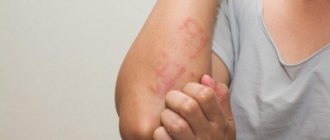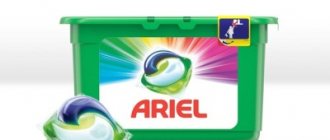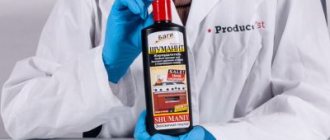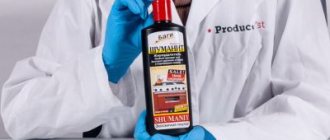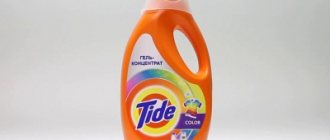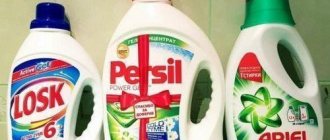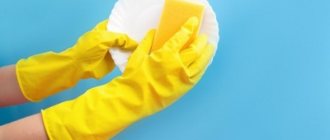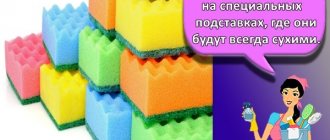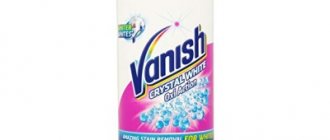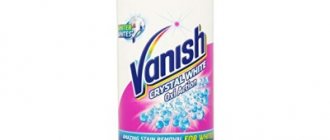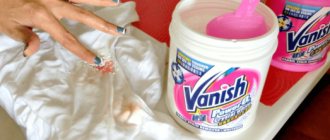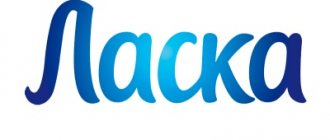In pursuit of clean dishes and kitchen surfaces, many people forget about the safety of the detergents they use.
But in fact, aggressive chemical components of household chemicals (surfactants, phosphates) can cause considerable harm to human health.
Forming a thin, indelible film on the surface, chemicals penetrate into the body along with food and, accumulating, slowly poison it.
Soap will help protect yourself from the negative effects of chemicals, while achieving the desired result of clean dishes in the kitchen.
We'll talk about soap that can and can't be used for washing dishes below.
Can it be washed?
More and more housewives prefer a safe means of caring for kitchen utensils - soap. Which of the large number of types of this detergent can be used in the kitchen, and which one is better to avoid?
Economic
Laundry soap is an excellent alternative to traditional household chemicals. Its main advantage is its exclusively natural composition .
Vegetable oils, animal fats, alkali sodium hydroxide react with water to form a large amount of foam, which effectively cleanses any, even very old, stubborn dirt.
Laundry soap is allowed not only for washing dishes, but also for treating accessories for small children and food (vegetables, fruits).
The more fatty acids in the soap (the indicator is indicated as a percentage on the bar), the faster it will be possible to clean dirty dishes. High-quality laundry soap is a brown bar, without cracks, sticky traces , with a characteristic specific odor (without extraneous “aromas” of rancid oil or fish).
Degtyarny
Tar soap, like laundry soap, contains a large amount of fatty acids and alkali. Birch tar gives it special bactericidal and antiseptic properties. Tar soap helps quickly restore shine and shine to dishes.
The completely natural composition gives confidence in the safety of using this detergent. Even if a small amount of soap solution remains on the dishes, it will not cause any harm to the body.
The only reason why many people refuse to use tar soap for washing dishes is the specific smell. But this problem can be successfully solved by repeated rinsing under running water.
For children
Baby soap consists of 80% saponified fatty acids, which explains its excellent cleaning properties . The natural composition, minimal amount of fragrances and dyes allow you to use baby soap for daily treatment of children's accessories and dishes.
The only negative is that in cold tap water, baby soap practically does not foam, does not dissolve fat well, and is not completely washed off (leaves whitish stains on the surface).
Liquid
Liquid hand soap contains a sufficient amount of antibacterial and antifungal components that can disinfect the surfaces of kitchen utensils.
In addition, the plant components in this product help keep the skin of your hands soft and velvety .
But even with such positive properties, liquid soap should not be used for washing dishes. The thing is that this product contains many chemical non-food components (fragrances, dyes), which, even with very thorough rinsing, remain on the surface of the dishes, and later enter the body along with food.
Toilet (for hands)
Bar hand soap can be a relatively safe dishwashing product, provided that it contains a minimum amount of fragrances and dyes.
The disadvantage is that it is not able to break down large amounts of fat (dirty frying pans, pots and baking trays will remain dirty).
Special
Special soap is a detergent that contains medicinal and disinfecting components. Special or medical soap, as it is also called (vaseline, lanolin, carbolic), cannot be used for washing dishes, since it is not completely washed off from surfaces and, if ingested, can cause poisoning and diarrhea.
Disadvantages of laundry soap
Soap contains substances that do not dissolve in water. Since they are natural, they do not pose a danger to the body, but they leave unsightly whitish stains on the dishes. This side effect can be avoided if you use a large amount of warm running water to rinse off the foam.
Like many synthetic products, soap has an adverse effect on the skin of your hands. After washing dishes there is a feeling of dryness. The solution to the problem is simple - use rubber gloves or apply nourishing cream to your hands.
Use rubber gloves to protect your hands
The main disadvantage of laundry soap is that it does not foam well in hard water. This and other problems can be solved by preparing a gel from laundry soap.
How to use?
There is nothing easier than washing dishes with soap:
- Use a paper napkin to remove food debris and greasy deposits from the surface of dirty dishes (do not clog the sewer drains with grease).
- A deep basin is filled with hot water (alternatively, you can fill a kitchen sink with water, the drain of which is previously closed with a stopper).
- Dirty dishes are immersed in water. It is better to wash kitchen utensils in batches, starting with glasses and cups and ending with pots and pans covered in grease.
- Lather a soft sponge with soap (until foam forms).
- Wipe dirty dishes soaked in water with a soapy sponge, and then rinse them under running water.
Baking soda will help soften hard tap water, thereby increasing the cleaning properties of the soap solution (it is enough to dissolve 2-3 tablespoons of powder in ten liters of warm water).
Traditional methods for washing dishes
Folk remedies are safer than household chemicals for washing dishes
You can use folk recipes as a substitute for chemicals for washing dishes. They are time-tested and consist only of natural ingredients.
Choose the recipe that is most convenient for you:
- Mustard. Mix one part dry powder with two parts water and wait a few hours for the mixture to infuse. This composition will do an excellent job of removing congealed grease and clean the surface of the dishes from burnt-on food residues, without causing damage to the delicate coating.
- Soap and glycerin. Combine 0.5 liters of hot boiled water with 1/4 cup of crushed soap and mix until a homogeneous mass with foam is formed. Then, stirring slowly, pour in 2 tbsp. l. glycerin, the same amount of lemon juice and 1 tsp. vodka. For more convenient use, this mixture can be poured into any container after cooling. You can use an old detergent container as a reservoir; the main thing is to rinse it thoroughly.
- Soda. It copes well with carbon deposits on frying pans; you just need to rub the desired area with dry powder using a damp sponge. After dissolving baking soda in water, you can rinse a plastic or glass bottle.
- Fresh pumpkin leaves. Plants will help get rid of oil contaminants on the walls of blood vessels. To do this, you need to knead them a little and use them as a rag. This method will return the dishes to their original appearance and add shine.
- Vinegar and mustard. You need to mix 0.2 liters of vinegar with the same amount of water, add 2 tbsp. l. mustard solution prepared according to the first recipe, 1 tbsp. l. lemon juice and 1 tsp. corn starch. With this mixture, old stains can be easily washed off in a few minutes.
- Vinegar. Can be used in concentrate and as a solution. With its help you can easily get rid of limescale, blackening, and rust. Acid also cleans glassware well, restoring its shine.
- Pine and fir cones. Boil 100 g of cones in 1 liter of water, strain the broth. Mix 1 cup of broth with 2 tbsp. l. soda, salt and crushed soap and bring in a water bath until a homogeneous consistency is formed, stirring constantly. When using 50 ml of this product, mix it with 5 liters of water.
There are many options that will replace harmful chemical cleaning mixtures. You can choose formulations that are made using only natural ingredients or natural products that have a cleansing effect. You can be confident in the composition of your dishwashing detergent only if you prepare it yourself.
Choose the option that you think is most acceptable. The main thing is that the harm is minimal or completely absent. It is this criterion that laundry soap meets in full.
How to do it yourself?
It’s possible to make dishwashing soap (in no way inferior in quality to store-bought products) with your own hands.
Algorithm of actions:
Rub 100 grams of soap (better than laundry soap), mix 6 tbsp. hot water. The shavings are stirred until completely dissolved (the process can be accelerated by slowly whisking the soap solution with a mixer).- The resulting gel is divided into three parts. Add 1 tbsp to one. dry mustard, in another - 2 tbsp. coffee grounds, in the third - 1 tbsp. castor oil.
- Each mass is poured into the prepared mold in layers. In the process of forming the bar, it is important to wait until one layer dries, and only after that pour out the next one (for better adhesion of the two masses, the dried surface is coated with alcohol).
The solidified block is removed and left to dry (about seven days) in a dark, dry place.
Composition of a brown block
A reasonable question often arises: is it possible to wash dishes with laundry soap? Absolutely yes. Laundry soap made in accordance with GOST consists only of natural ingredients. No surfactants or phosphates that are harmful to health are added to it.
What does laundry soap consist of? The basis is fats, vegetable oils and sodium salts. Classic soap does not contain fragrances, preservatives or dyes. Therefore, you don’t have to worry that any remaining product on the dishes will cause harm. Also, the soap solution can be poured out without fear, because its composition is harmless to the environment.
Allergy sufferers can also be advised to use laundry soap. At the same time, it effectively cleanses and even has a bactericidal effect.
How to choose?
The main criterion by which you should choose dishwashing soap is its composition. Even repeated rinsing does not fully guarantee that no detergent particles will remain on clean dishes.
Therefore, it is very important that the composition includes only natural ingredients (a large number of flavors, dyes and fragrances is a reason to refuse the purchase).
The second criterion is smell . The soap should not have a strong smell. A strong chemical or strong perfumed aroma is also a reason to refuse a purchase.
The third criterion is color. Soaps with bright, saturated colors are not suitable for cleaning dishes (chemical dyes leave a colored film on surfaces). The exception is laundry and tar soap, whose rich brown tint is explained by the presence of a large number of natural ingredients.
Is there an alternative?
It's no surprise that people are thinking about alternative ways to wash their dishes. Will there be such a result if you wash dishes with laundry soap? Expert opinion boils down to the fact that this option is safer.
But if we take the situation in general, there are three ways to solve the problem:
- Buy detergents after carefully studying their composition.
- Use baking soda, mustard powder or soap.
- Make your own detergent.
Important! It turns out that purchasing environmentally friendly detergent in the store is not easy, and its cost is quite high. Therefore, you have to use improvised means. For example, laundry soap.
TOP 3 best products
When choosing dish soap, you should pay attention to the following products:
Tavinka Mustard
Tavinka “Mustard” dishwashing soap is an environmentally friendly product, hand-brewed . Castor and olive oil, citric acid, mustard powder and sodium salts of fatty acids wash away any dirt in cold water without leaving any residue.
Soap has an antibacterial effect. After use it does not leave streaks on glassware. Allowed for processing children's dishes, washing vegetables and fruits. The average cost is 330 rubles. (set of two bars). Read reviews here.
Bereginya
Bereginya laundry and dishwashing soap consists exclusively of natural ingredients that ensure the safety of using the product. Salt, soda and mustard quickly dissolve fat and remove stubborn dirt.
Lemon essential oil disinfects surfaces and eliminates unpleasant odors. Castor and grape oils care for the delicate skin of your hands. Soap is an organic product, completely decomposes, and does not pollute the environment. The average cost is 175 rubles. (for 1 piece). Read reviews here.
Pure coconut Mi&Ko
Mi&Ko “Pure Coconut” laundry soap is one of the best natural dishwashing detergents. The soap foams well, removing grease, food debris and other contaminants from the surface of plates, spoons, cups and pots without leaving any residue.
The absence of dyes, fragrances and other synthetic components protects the delicate skin of the hands from irritation even during prolonged contact with a soap solution . The soap is washed off without residue and does not leave streaks on glass surfaces.
The average cost is 110 rubles. (for 1 piece). Read reviews here and here.
You need to smell the soap before purchasing. A sharp, unpleasant odor indicates low quality of the product.
What are the dangers of special dishwashing detergents?
At first glance, it may seem that the problem of cleaning dishes from dirt has been solved a long time ago. On store shelves there are entire battalions of gels, liquids and powders that are designed for washing and cleaning kitchen utensils made of a variety of materials - from porcelain to metal.
Important! Most of these substances eliminate dirt in the shortest time. They are also used sparingly. A drop of detergent to wash a mountain of dirty dishes isn't just a marketing ploy, it's the truth.
However, the components of detergents are far from safe for health. Even when thoroughly rinsing the dishes, they are not completely washed off. This means they mix with food and penetrate the digestive tract.
Important! The body gradually accumulates harmful chemical compounds that can provoke allergic reactions and various diseases.
Surfactants (surfactants) cause the following result:
- contribute to a decrease in immunity;
- have a negative effect on the immune system;
- even cause an increase in blood cholesterol levels.
Phosphates, which enhance the effect of surfactants, are also dangerous for the body. They are so harmful that in a number of countries the production of detergents containing phosphoric acid salts is prohibited.
Adviсe
The method of boiling with soap will help to wash off thick greasy layers from pots and pans . The shavings of half a bar of soap are dissolved in ten liters of water.
Dip very dirty dishes into the soap solution and boil them for thirty minutes. After this procedure, dense layers of fat and soot will easily come off the surface of pots and pans under the pressure of running water.
You should not buy white or light brown laundry soap for dishes. This product is enriched with a variety of chemical additives (for example, bleach) that are hazardous to human health.
Laundry soap dries out the skin very much. Rubber gloves will help protect your hands from irritation and peeling .
Sterilization methods
Regardless of the chosen disinfection method, bottles must first be washed using soda or salt, special liquids produced for the care of baby dishes. The walls must be thoroughly cleaned of plaque and milk mixture.
Boiling
To disinfect glass bottles, use a small saucepan, fill it to the top with water and place it on the stove. Place the unwrapped container in it and boil under the lid for about 10 minutes. Do not expose plastic models to heat. The material melts and releases toxins. Before sterilizing bottles, it is recommended to first boil hard water, otherwise the dishes will become coated.
Steam treatment
In the absence of special household appliances, you can destroy germs on children's dishes by using kitchen utensils. Water is poured into a saucepan or stewpan, a colander is placed on top, and jars and bottles are placed on top of it upside down. After the liquid boils, steam is released; you need to hold the pan over it for at least 10 minutes.
Special sterilizer
Disinfecting a child's accessories by boiling takes a lot of time; when disinfecting bottles with steam, it is easy to get burned, and many parents buy sterilizers. The device is manufactured in the form of a reservoir that can accommodate dishes with different neck diameters.
The electric model consists of a housing, a heating element, a container for liquid, operates from a 220V network:
- A glass of water is poured into a special compartment.
- Bottles and nipples are provided.
- Lower the lid.
- Press the power button.
Microwave sterilizers are placed in a microwave, where jars and other utensils are disinfected with steam for 10 minutes. Ultraviolet devices that are powered by mains or batteries do not use water; the bottles are disinfected with rays from lamps located inside the body. Some models of sterilizers not only kill germs, but also warm up the baby's formula.
Multicooker or steamer
Modern household appliances such as multicookers come to the aid of young mothers, in which they prepare dietary dishes from meat, fish, side dishes from cereals and steamed vegetables. Baby dishes, along with pacifiers and nipples, are placed on a wire rack or strainer, the lower bowl is filled with water, the steam mode is selected and the time is set.
Microwave
To heat a portion of the mixture, it is not necessary to light a fire or place a pan on the stove. For this purpose, people are increasingly using modern technology - the microwave. It also disinfects dishes that are filled with formula for the baby. Place the bottles in a glass bowl, which is placed in the oven, for 3 minutes. Nipples and elastic bands are sterilized separately.
Special means
Modern parents often travel with children. To feed your baby on the road, the dishes must be disinfected. Pharmacies sell special antiseptics that destroy germs.
In cold water
It is not always possible to have boiling water at hand; tablets containing sodium dichloroisocyanurate are not dangerous for children and dissolve in cold water. To disinfect bottles:
- The composition is poured into a deep bowl.
- Lower the dishes and nipples so that they are completely in the liquid.
- Leave for half an hour.
It is not recommended to use tablets every day. It is better to disinfect bottles with steam before feeding, which destroys all harmful bacteria.
Making your own dishwashing detergents
No matter how much we scold liquid detergents, the temptation to use them is very great: they are very convenient to use. Is it possible to wash dishes with liquid soap? Let's make a liquid detergent composition based on laundry soap with our own hands to make the whole process easier.
Paste for heavily soiled dishes
To wash dishes faster with laundry soap, you can prepare a simple solution. Ingredients you will need for this:
- Laundry soap - ¼ bar.
- Baking soda - 1.5 tbsp. l.
- Mustard powder - 1.5 tbsp. l.
- Ammonia - 2 tbsp. l.
How to cook:
- Grate the soap, add water (0.5 cups) and dissolve in a water bath.
- As the soap dissolves, add another 0.5 cup of water.
- The result is a mixture that resembles the consistency of thick sour cream.
- Cool the mixture slightly.
- Add mustard and soda to it.
- Mix thoroughly.
- Then pour in ammonia.
- All that remains is to beat the solution with a mixer and you can use it.
Detergent composition with glycerin
You can make another, no less effective composition. Ingredients:
- Laundry soap - 25-30 g.
- Water - 0.5 l.
- Glycerin - 4 tbsp. l.
- Vodka - 1 tbsp. l.
The cooking procedure is as follows:
- Grate the soap.
- Add 3 tablespoons of hot water to the soap. Melt the solution in a water bath or in the microwave.
- Add 0.5 liters of hot water to the mixture.
- Cool the solution. Mix vodka and glycerin into it.
- Pour the resulting detergent into a container with a dispenser.
You can experiment with the solution to make it even more effective.
- Add mustard - it dissolves fat well.
- Use a solution of all coffee grounds. It does a good job of scrubbing away dried-on food residues. However, it must be washed off especially carefully.
- Add soda to the water if the water is very hard.
- To make the solution concentrated, add less water.
- You can use the solution to prepare special “dishwashing” soap. In this case, you need to take the bare minimum of water, spread the mixture into molds and let it sit until it hardens.
